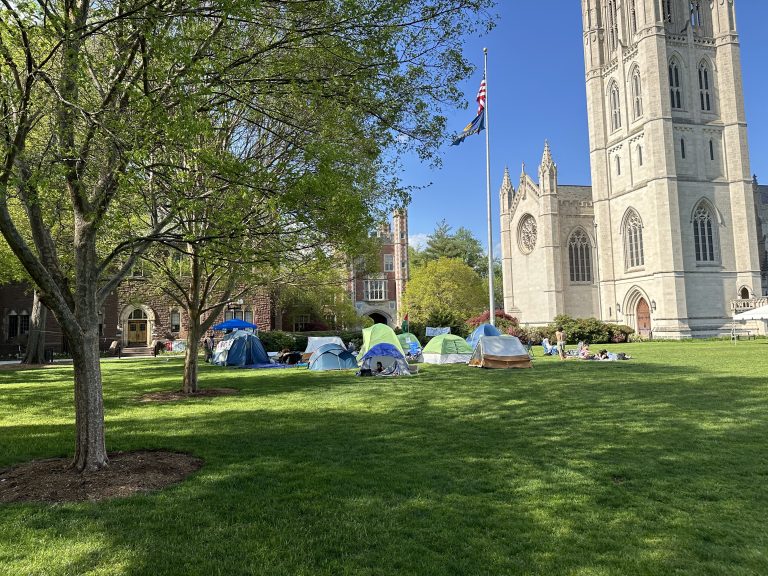Caitlin Doherty ’26
News Editor
Many U.S. colleges and universities use transcript withholding practices to attempt to force both current and former students to repay their educational debts. It is estimated that over 6 million individuals in the United States have college credits they cannot access because of outstanding student debt, according to Ithaka S+R researchers. When individuals request their transcript from a college or university for job applications or other needs, offices will refuse to provide the documents until their debt to the institution is paid. However, without an official transcript, many applicants are not selected for job positions, therefore enforcing a system in which individuals are not hired for jobs that would provide needed stability to pay off student debts. “Most alarmingly, the practice of withholding a transcript and proof of a student’s academic credits and degree progress due to an unpaid balance has a disproportionate impact on economically-disadvantaged students. This practice perpetuates cycles of poverty; constructs barriers to access, resources, and opportunities; and limits upward mobility for students,” wrote Lisa Hammersley, executive director of the School and State Finance Project, in a testimony letter supporting a recently enacted Connecticut law aimed at addressing the issue.
Officially effective on Oct. 1, 2023, “An Act Prohibiting an Institution of Higher Education From Withholding Transcripts” was approved during the 2023 Connecticut legislative session and signed into law by Governor Ned Lamont on June 7, 2023. The bill passed the Connecticut House of Representatives 117-33 and the state Senate 35-0, with only one member of each body choosing not to vote. The law includes three main stipulations to ensure transcripts are not withheld from students who need official documents to apply for or continue employment or serve in specific U.S. military positions. In situations where transcripts are needed for employment purposes, educational institutions cannot make the release of a student’s transcript conditional on the status of the debt payment, generally manipulate transcript requests as a method to collect payments, or charge a higher transcript request fee because of owed debts. Overall, the bill is a result of compromise by prohibiting transcript holds only for purposes of employment, while still allowing institutions to withhold transcripts for other reasons, such as when a student has decided to attend a different school and needs an official transcript to transfer credits.
Research conducted by the Connecticut chapter of Education Reform Now found that in 2022, every single institution of higher education in Connecticut, including Trinity, had policies that allow official transcripts to be withheld from students or alumni with debt owed to their institution. As of Oct. 22, 2023, not yet updated in accordance with the recently enacted law, Trinity College’s webpage on transcript requests reads, “Transcripts will not be processed if you have any outstanding financial obligations to Trinity College.” In a February 2023 letter to the state’s Higher Education and Workforce Advancement Committee regarding the bill, Jennifer Wildness, president of the Connecticut Conference of Independent Colleges, of which Trinity is a member, wrote, “For the independent colleges, if transcript holds were banned outright, they would have no mechanism to keep students engaged to pay off their debts, they would be forced to go to collections more consistently and, in the long run, the elimination of the ability to place a transcript hold may result in increased tuition costs for students and their families. For these reasons, we appreciate the compromise language that this bill provides. It allows institutions to continue to place holds on transcripts but requires that a transcript be shared for purposes of employment.”
Two public universities, Central Connecticut State University and the University of Connecticut, submitted testimonies during legislative hearings for the bill in February. While Central Connecticut State University wrote in broad support of the legislation, UConn representatives took a more nuanced stance, explaining that university offices work closely with students and families to set up payment plans and offer alternative options when individuals are struggling to meet financial dues. While the University is supportive of the specific stipulations of the Connecticut law and is willing to make exceptions for students who need official transcripts to apply for job opportunities, ultimately, the ability to withhold transcripts in non-employment-related situations provides important leverage for the University in receiving money it is owed. “The University [of Connecticut] acknowledges that no matter what systems we have in place, there are students that have legitimate obstacles to paying their debts on time. We also acknowledge that some students may simply choose to avoid this responsibility, and the threat of not obtaining a certified transcript may be the most effective measure for the university to obtain any balances due… It is our responsibility to do what we can to collect these outstanding debts.”
While those in opposition to the bill argue that this new policy will remove vital power from educational institutions to ensure that debts are paid, advocates for reform believe that the barriers transcript withholding policies pose only make it more difficult for students to make the income required to pay back debts. “This practice prevents students from continuing their education, transferring credits, and getting jobs. Transcript withholding disproportionately harms low-income students and those who do not complete their degrees, who struggle to pay what they owe before they have completed their degree and obtained a good paying job,” reflected members of the policy team at the Hartford Foundation for Public Giving in a written testimony from February 2023. “There are numerous other methods an institution of higher education could employ to pursue outstanding debts without resorting to withholding transcripts… Students unable to pay their debts should still have access to their transcripts to allow them to finish their studies and obtain a job to ensure that they can make payments in the future.”
Connecticut is the ninth state to pass legislation requiring higher education institutions to provide transcripts to students regardless of their student debt status, according to the Connecticut Mirror. Other states that have instituted similar laws include many of Connecticut’s progressive peers, including Massachusetts, New York and Washington, with California being the first to enact a law prohibiting debtbased transcript withholding practices in 2019. In May 2023, within a larger packet of potential regulations that would affect all higher education institutions that receive federal funding, the U.S. Department of Education proposed a policy that would similarly prohibit debt-based transcript withholding, according to Inside Higher Ed. The public commenting period closed on June 20, and an official decision from the department about whether the policy will be enacted has not yet been announced. This proposal from the Department of Education offers the possibility for most U.S. college students to be able to access their earned academic credit and transcripts regardless of the debt they may owe.







+ There are no comments
Add yours